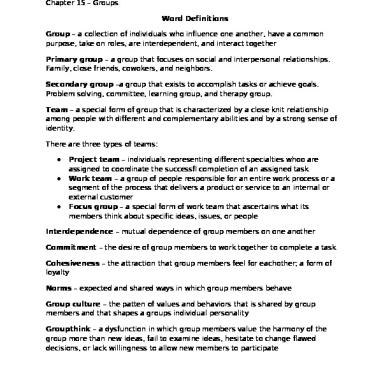Communications Test Review Chapter 6
This document was uploaded by user and they confirmed that they have the permission to share it. If you are author or own the copyright of this book, please report to us by using this DMCA report form. Report DMCA
Overview
Download & View Communications Test Review Chapter 6 as PDF for free.
More details
- Words: 347
- Pages: 3
Communications Test Review Chapter 6
Word Definitions Listening – the process of receiving, constructing meaning from, and responding to spoken or nonverbal messages HURIER model – a six stage model of the listening process Hearing – a passive physiological process in which sound is received by the ear Understanding – assigning meaning to the stimuli that have been selected and attended to Remembering – recalling something from stored memory Interpreting – the process of understanding a message from the speaker’s point of view Evaluating – analyzing evidence, sorting fact from opinion, determining speaker’s intent, judging accuracy of speaker’s statement and decisions Responding – overt verbal and nonverbal behavior by the listener indicating to the speaker what has and has not been received Listening for information – listening to gain comprehension Evaluative listening – listening to judge or analyze information Empathic listening – listening to understand what another person is thinking or feeling Listening for enjoyment – listening for pleasure Critical listening – listening that judges the accuracy of the information presented, determines the reasonableness of its conclusions, and evaluates its presenter Critical thinking – the ability to analyze and assess information
HURIER Model
Ineffective and Effective Listening Habits Bad Listening
Good Listening
Thinks that topic or speaker is of no Finds areas of interest – keeps an open interest mind Focuses on speaker’s appearance and Concentrates on content of presentation delivery and overlooks characteristics of speaker Listens only for details
Listens for ideas
Avoids difficult material
Exercises the mind – prepares to listen
Is easily distracted
Resists distractions
Fakes attention
Pays attention
RURER: Receive – Understand – Remember – Evaluate – Respond Better Listening Skills: Ask questions. Seek clarifcation. Consider your frame of reference – known and new information. Paraphrase new information. Better Understanding Skills: Mnemonic devices. Clustering. Repeating. Concise note taking. Better Evaluation Skills: Separate fact from fiction. Don’t judge the message, but detect any bias. Better Response Skills: Eye contact. Connect listening to understanding. Honesty.
4 Types of Listening Skills: 1. 2. 3. 4.
Listening Listening Listening Listening
for appreciation for empathy for comprehension critically
Word Definitions Listening – the process of receiving, constructing meaning from, and responding to spoken or nonverbal messages HURIER model – a six stage model of the listening process Hearing – a passive physiological process in which sound is received by the ear Understanding – assigning meaning to the stimuli that have been selected and attended to Remembering – recalling something from stored memory Interpreting – the process of understanding a message from the speaker’s point of view Evaluating – analyzing evidence, sorting fact from opinion, determining speaker’s intent, judging accuracy of speaker’s statement and decisions Responding – overt verbal and nonverbal behavior by the listener indicating to the speaker what has and has not been received Listening for information – listening to gain comprehension Evaluative listening – listening to judge or analyze information Empathic listening – listening to understand what another person is thinking or feeling Listening for enjoyment – listening for pleasure Critical listening – listening that judges the accuracy of the information presented, determines the reasonableness of its conclusions, and evaluates its presenter Critical thinking – the ability to analyze and assess information
HURIER Model
Ineffective and Effective Listening Habits Bad Listening
Good Listening
Thinks that topic or speaker is of no Finds areas of interest – keeps an open interest mind Focuses on speaker’s appearance and Concentrates on content of presentation delivery and overlooks characteristics of speaker Listens only for details
Listens for ideas
Avoids difficult material
Exercises the mind – prepares to listen
Is easily distracted
Resists distractions
Fakes attention
Pays attention
RURER: Receive – Understand – Remember – Evaluate – Respond Better Listening Skills: Ask questions. Seek clarifcation. Consider your frame of reference – known and new information. Paraphrase new information. Better Understanding Skills: Mnemonic devices. Clustering. Repeating. Concise note taking. Better Evaluation Skills: Separate fact from fiction. Don’t judge the message, but detect any bias. Better Response Skills: Eye contact. Connect listening to understanding. Honesty.
4 Types of Listening Skills: 1. 2. 3. 4.
Listening Listening Listening Listening
for appreciation for empathy for comprehension critically
Related Documents

Communications Test Review Chapter 6
June 2020 5
Communications Test Review Chapter 2
June 2020 5
Communications Test Review Chapter 15
June 2020 6
Communications Test Review Chapter 3
June 2020 3
Communications Test Review Chapter 1
June 2020 5